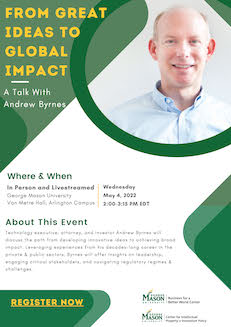The following post comes from Tuan Tran, a rising 3L at Scalia Law and a Research Assistant at C-IP2.

Small ideas can lead to big changes, which in turn can make a significant impact on the world, but—as technology executive, attorney, and investor Andrew Byrnes knows well—this is no easy task. Read more
 Issue
Issue By Colin Kreutzer
By Colin Kreutzer By Camilla Hrdy
By Camilla Hrdy By
By  This past Tuesday, CPIP and the
This past Tuesday, CPIP and the  As digital piracy shifts away from torrent downloads and towards
As digital piracy shifts away from torrent downloads and towards  By Mandi Hart
By Mandi Hart In a recent essay responding to a divisive critique of his book, Justifying Intellectual Property, Robert Merges makes clear from the start that he won’t be pulling any punches. He explains that the purpose of his essay,
In a recent essay responding to a divisive critique of his book, Justifying Intellectual Property, Robert Merges makes clear from the start that he won’t be pulling any punches. He explains that the purpose of his essay,